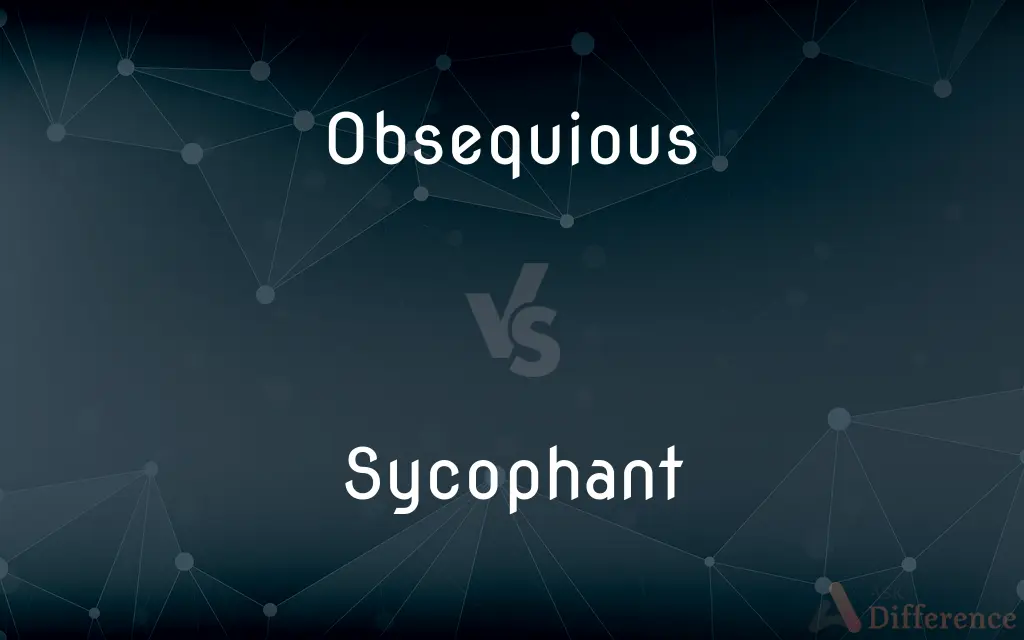Obsequious vs. Sycophant — What's the Difference?
By Tayyaba Rehman — Updated on November 7, 2023
Obsequious describes a person's fawning behavior, excessively eager to please or obey. A sycophant is a person who acts obsequiously towards someone important to gain advantage.

Difference Between Obsequious and Sycophant
Table of Contents
ADVERTISEMENT
Key Differences
Obsequious behavior is characterized by a servile readiness to fall in with the wishes or will of another. It implies a fawning or subservient demeanor that can be seen as ingratiating or overly compliant. A sycophant, on the other hand, is not just compliant but also actively seeks to flatter and ingratiates themselves to those of higher status or power. While both seek to please, obsequiousness is the manner, and sycophancy is the strategic action.
The term obsequious comes from the Latin "obsequiosus," meaning compliant or obedient, and typically refers to someone who is overly eager to help or agree with someone else. Sycophant has a more negative connotation, originating from the Greek "sykophantes," meaning one who shows insincere flattery to gain personal advantage. Obsequiousness may be seen in behavior, whereas sycophancy is attributed to the person's character.
An obsequious individual might be excessively polite and attentive, often to the point of being perceived as insincere. Their behavior is geared toward being agreeable and amenable. A sycophant, in contrast, is more strategically manipulative, engaging in flattery and servile behavior with the specific intent of currying favor or advancing their own interests.
When describing someone as obsequious, it suggests a weakness or lack of self-respect in the person exhibiting this behavior. Sycophant, however, implies a tactical choice and a certain cunning; the sycophant knows what they are doing and chooses flattery as a tool to achieve their goals. The obsequious person may simply be seeking acceptance, while the sycophant seeks a tangible benefit.
Obsequious individuals may simply have a tendency to be overly compliant or deferential, perhaps out of insecurity or a desire for acceptance. Sycophants have a clear goal in mind: to improve their own status or gain specific favors. Obsequiousness is about behavior, sycophancy about intent and outcome.
ADVERTISEMENT
Comparison Chart
Part of Speech
Adjective
Noun
Etymology
Latin "obsequiosus" (compliant, obedient)
Greek "sykophantes" (slanderer, informer)
Usage in a Sentence
Describes behavior
Describes a person
Connotation
Negative, but less intense; can imply a desire to please for the sake of peace or harmony
Strongly negative; implies self-serving flattery or brown-nosing
Motivation
Can be driven by a genuine desire to please or by insecurity
Driven by self-interest and the desire for personal gain
Compare with Definitions
Obsequious
Attentive to an ingratiating degree
His obsequious attention to the guests was noted by all.
Sycophant
One who acts obsequiously toward someone important
He was known as a sycophant, always cozying up to the supervisors.
Obsequious
Overly polite or reverential
He was obsequious in his manner, bowing deeply and often.
Sycophant
A person who flatters for personal gain
The sycophant lavished the CEO with compliments in hopes of a promotion.
Obsequious
Excessively eager to please or obey
She gave the visiting dignitaries an obsequious smile.
Sycophant
A self-seeking, servile flatterer
The sycophant at the party was clearly angling for an invitation to the next big event.
Obsequious
Subservient to a fault
The obsequious intern did not dare to offer his own opinion.
Sycophant
Someone who uses insincere praise to gain advantage
The sycophant had a reputation for manipulating every conversation in his favor.
Obsequious
Showing servile compliance
The obsequious employee nodded at every statement his boss made.
Sycophant
A person who seeks favor by flattering people of influence
She avoided the sycophant who was always praising the manager excessively.
Obsequious
Full of or exhibiting servile compliance; fawning.
Sycophant
A person who attempts to gain advantage by flattering influential people or behaving in a servile manner.
Obsequious
Excessively eager and attentive to please or to obey instructions; fawning, subservient, servile.
Sycophant
One who uses obsequious compliments to gain self-serving favour or advantage from another; a servile flatterer.
Obsequious
(archaic) Obedient; compliant with someone else's orders or wishes.
Sycophant
One who seeks to gain through the powerful and influential.
Obsequious
(obsolete) Of or pertaining to obsequies, funereal.
Sycophant
(obsolete) An informer; a talebearer.
Obsequious
Promptly obedient, or submissive, to the will of another; compliant; yielding to the desires of another; devoted.
His servants weeping,Obsequious to his orders, bear him hither.
Sycophant
To inform against; hence, to calumniate.
Obsequious
Servilely or meanly attentive; compliant to excess; cringing; fawning; as, obsequious flatterer, parasite.
There lies ever in "obsequious" at the present the sense of an observance which is overdone, of an unmanly readiness to fall in with the will of another.
Sycophant
To play the sycophant toward; to flatter obsequiously.
Obsequious
Of or pertaining to obsequies; funereal.
Sycophant
An informer; a talebearer.
Obsequious
Attempting to win favor from influential people by flattery
Sycophant
A base parasite; a mean or servile flatterer; especially, a flatterer of princes and great men.
A sycophant will everything admire:Each verse, each sentence, sets his soul on fire.
Obsequious
Attentive in an ingratiating or servile manner;
Obsequious shop assistants
Sycophant
To inform against; hence, to calumniate.
Sycophanting and misnaming the work of his adversary.
Sycophant
To play the sycophant toward; to flatter obsequiously.
Sycophant
To play the sycophant.
Sycophant
A person who tries to please someone in order to gain a personal advantage
Common Curiosities
Can a person be both obsequious and a sycophant?
Yes, someone can exhibit obsequious behavior and also be a sycophant if they flatter for personal gain.
Are sycophants aware of their behavior?
Typically, yes. Sycophants use flattery strategically to get what they want.
Is obsequious behavior always intentional?
Not always; it can stem from a person's nature or desire for acceptance.
What is the goal of a sycophant?
To gain favor, advantages, or material benefits from someone of influence.
Is being obsequious a positive trait?
Generally no, it's seen as overly submissive and potentially insincere.
What does it mean if someone is obsequious?
It means they're overly submissive and eager to please.
How can you tell if someone is being obsequious?
They may be overly compliant, eager to agree, or excessively polite beyond normal courtesy.
Can "obsequious" be used to describe an action?
Yes, actions can be described as obsequious if they are excessively eager to please.
Do sycophants believe their own flattery?
Often, they do not. Their praise is usually insincere and self-serving.
Do sycophants target specific people?
Yes, they typically target those in positions of power or authority.
Is sycophancy a form of manipulation?
Yes, sycophants manipulate by using flattery to gain favors.
Can "obsequious" have a neutral meaning?
Rarely, it is almost always used with a negative connotation.
Can being obsequious ever be beneficial?
It might be in the short term to avoid conflict, but it often leads to a lack of respect in the long term.
Is "sycophant" only applicable to people of lower status?
No, it can refer to anyone who uses flattery to gain favor, regardless of their status.
Why is sycophancy frowned upon?
It's considered deceitful as it involves insincere flattery to exploit others.
Share Your Discovery

Previous Comparison
Whiteboard vs. Blackboard
Next Comparison
Flood vs. TsunamiAuthor Spotlight
Written by
Tayyaba RehmanTayyaba Rehman is a distinguished writer, currently serving as a primary contributor to askdifference.com. As a researcher in semantics and etymology, Tayyaba's passion for the complexity of languages and their distinctions has found a perfect home on the platform. Tayyaba delves into the intricacies of language, distinguishing between commonly confused words and phrases, thereby providing clarity for readers worldwide.















































